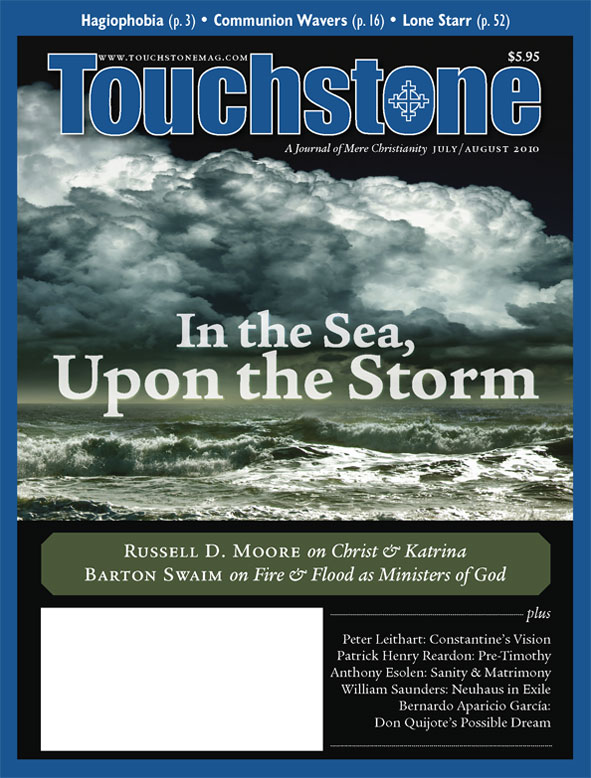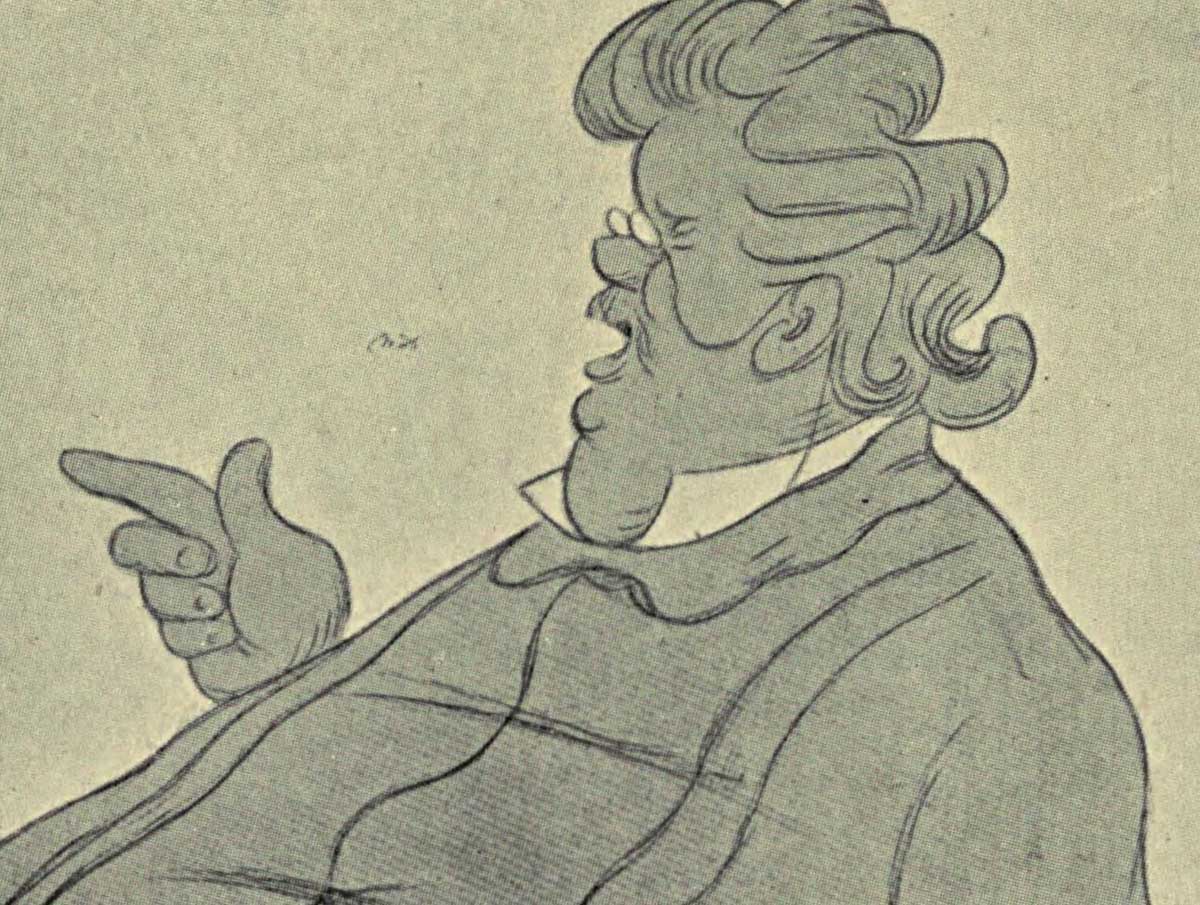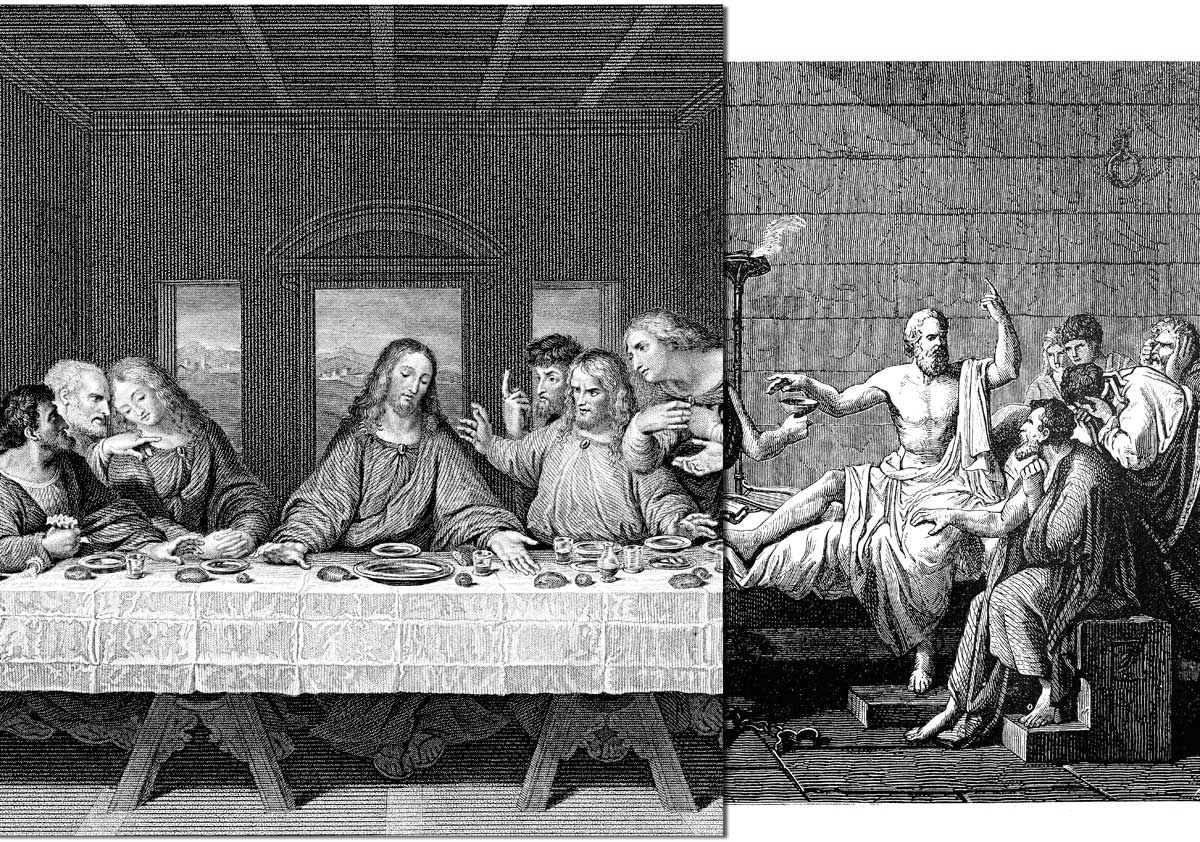Non Sequitur
The End of Secularism
by Hunter Baker
Crossway Books, 2009
(224 pages, $17.99, paperback)
reviewed by Paul J. Cella III
With The End of Secularism, my friend Hunter Baker of Union University has produced a volume of careful and cogent exposition that is accessible both to the beginner in the subject and to those long immersed in its twisted and forbidding passageways. That subject, of course, is secularism, for which Baker provides several useful definitional statements early in the book: “Secularism means that religious considerations are excluded from civil affairs,” and it denotes “the ordering of the community without reference to God.” In other words, “private religion is at the heart of secularism.”
In medieval times, the word “secular” meant something quite different: It connoted the idea of a churchman whose work was “in the world”—a parish priest, say, or a minister to the sick or destitute—as against a churchman “who served in segregation from the world,” laboring and praying in a monastery or convent. It is manifest that the modern world has diverged markedly from this understanding of “secular,” but the shadow of that vital distinction between natural and supernatural remains.
Rhetorical Chicanery
In America in our age, secularism has become deeply entangled in the labyrinth of legal reasoning, revision, and innovation accruing around the First Amendment to the Constitution. In a nation made by lawyers and boasting more lawyers than the rest of the world combined, it is hardly surprising that our most problematic public disputes would become encrusted with supererogatory legalism. The convolution of First Amendment law is perhaps epitomized by the fact that, according to Supreme Court precedent, we must begin reading the Amendment under the pretense that its first word has been removed or radically revised: “Congress” functions now as something closer to a metonym for “all legislative bodies.”
Baker touches on these themes, pointing out, with a dry wit, how the legal doctrine of incorporation has converted the meaning of the First Amendment’s religion clauses into what amounts to a non sequitur: “Regulation of religion is a matter for the states. And that goes for the states, too.”
Legal fictions aside, the intellectual essence of secularism, according to Baker, is a cheap rhetorical trick, or, to describe it more generously, a very detailed and intricate dog and pony show designed to keep us inattentive to reality. It is the pretense that you can kick out the supports for the edifice of traditional morality, stand and watch in some bewilderment as it collapses in a cloud of debris and mayhem and dust, and then rummage about in the ruins while appealing like some madman to a vague consensus in order to convince everyone that a new structure has already been built.
“Consensus,” for many modern liberals, is just a softer term for “orthodoxy”; and the frequent appeals to it is indicative of the problem that secularism tries and fails to solve—the problem of pluralism, of competing truth-claims active within the same political sovereignty.
Dramatic gestures toward tolerance do not solve this problem, for the idea of tolerance presupposes a particular view of the human person, the inherent dignity and liberty of man, which must be protected from coercion. The conceit of the secularist is that by prescinding religious orthodoxies from the public square, we will secure that long-desired consensus around the principle of tolerance.
Thus, tolerance itself becomes a public orthodoxy, not by superior reasoning, but by rhetorical sleight of hand. As Baker puts it, “Bracketing off religion does not solve the problem of toleration. It just disadvantages one set of orthodoxies from interacting with the many secular orthodoxies roaming free in a liberal society.”
How secularists have managed to convince so many with their rhetorical chicanery, or why so many modern minds have become mesmerized by it, is a story perhaps for our psychologists to decipher. Meanwhile, Baker provides a helpful narrative that not only summarizes the state of things now, but also brings some unappreciated scholars and thinkers into the conversation.
A Blow for Clarity
Baker’s discussion of the tensions between science and religion is similarly cogent. His treatment of the recurrent alarums sounded by progressives and liberals, warning of an approaching theocratic despotism effected through Christian intrigues, is wry and engaging. His chapter “Secularists Sit One Out in the Bible Belt” combines an appealing narrative with tight argumentation.
A selection from his final Summary exemplifies the judicious common sense that characterizes this book:
Secularism is not neutral, nor is it something that simply happened thanks to the growing maturity and rationality of human beings. It is an understandable reaction to the various tragedies of church-state alliances in Western history. It is not, however, necessarily more rational nor more harmonious than any number of alternatives. It cannot claim the authority of science. It cannot escape the need to look beyond materialism in order to discover values. Secularism . . . is more of a boast or a way to score rhetorical points than it is a concept that performs any actual work.
I believe that this book will strike a blow, not merely for clarity, but also for justice and truth, when the end of secularism has indeed arrived. When that day dawns, Hunter Baker will have had his part in the victory.
To some bewildered secularist who, faced with a strongly argued religious position, throws up his hands in frustration and shouts, “Why do religious people always have to make things so difficult!”, we can answer, with Baker, that the reason people “bring their comprehensive views to bear” on political reality “is that they have integrity.”
Paul J. Cella III is a writer living in Atlanta, Georgia, and editor of the website Cella's Review ( www.cellasreview.blogspot.com).
subscription options
Order
Print/Online Subscription

Get six issues (one year) of Touchstone PLUS full online access including pdf downloads for only $39.95. That's only $3.34 per month!
Order
Online Only
Subscription

Get a one-year full-access subscription to the Touchstone online archives for only $19.95. That's only $1.66 per month!
bulk subscriptions
Order Touchstone subscriptions in bulk and save $10 per sub! Each subscription includes 6 issues of Touchstone plus full online access to touchstonemag.com—including archives, videos, and pdf downloads of recent issues for only $29.95 each! Great for churches or study groups.
Transactions will be processed on a secure server.
more from the online archives
calling all readers
Please Donate
"There are magazines worth reading but few worth saving . . . Touchstone is just such a magazine."
—Alice von Hildebrand
"Here we do not concede one square millimeter of territory to falsehood, folly, contemporary sentimentality, or fashion. We speak the truth, and let God be our judge. . . . Touchstone is the one committedly Christian conservative journal."
—Anthony Esolen, Touchstone senior editor









